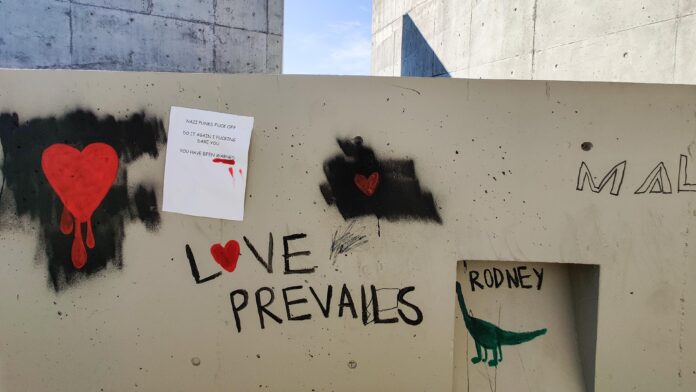Police tracking email servers, email recipient says university should do more
Twenty-five staff — including some students — linked to the African American studies and political science departments received an email on Oct. 25 containing the message “It’s okay to be white.” Five days later, a student reported graffiti containing two discrete N-words on the fifth floor of the Death Star.
The events follow a trend of white supremacist messages planted on campus. This past September, the second incident of anti-Semitic, neo-Nazi fliers posted on campus occured in less than a year. As with the groups who posted those fliers, Chancellor Gary May condemned the perpetrators of both recent acts — he addressed the emails in a statement and said, “All can be valued. All can be supported. All can be successful. White supremacy, hate and intimidation have no place here.”
His response to the graffiti contained a similar sentiment. “We do not and will not tolerate racism in any form,” the chancellor’s statement read. “We will take action when we discover who is behind this racist act.”
UC Davis Police Chief Joseph Farrow said that the graffiti, unfortunately, is a tough case.
“There are no leads and not much we can do because there were no witnesses, no cameras, no timeframe for when it happened,” Farrow said.
Farrow and his detectives tracked down the three different servers from which the emails were sent, located in Phoenix, Mountain View and San Francisco.
“We’re doing our best to engage and identify the source to ensure that it won’t be a hate crime,” he said, adding that police were continuing to track the servers and monitor their activity.
A recipient of the “It’s okay to be white” email, who wished to remain anonymous, asked for the university to do more.
“Who at the university is in charge of thinking about these issues?” the anonymous source said. “There should be a concrete plan that treats these messages as a possible endangerment to faculty and students.”
While the anonymous recipient said they believed the emails were tied to the 50th anniversary of ethnic studies programs at UC Davis, Farrow said that police found accounts on two different public sources during the week of August 25 of people encouraging others to download and send the message, suggesting that the emails don’t coincide with the anniversary.
Similar incidents have happened at other universities over the past two years, including at UC Davis, with fliers containing the same message found on campus buildings.
The email recipient called it a “rising trend of racial harassment.”
“We need more active vigilance and a preventative, informative plan,” they said.
Farrow said the racist acts angered him, but said he believed in the campus community’s ability to use its voice to say when things were wrong.
“It’s our community that responds and reports it,” he said. “That serves as a reminder that our campus gets it.”
Still, the recipient said that the university should also be aware of the dynamics at work when these acts occur, given the destabilizing effect such acts have on people.
“How do you call out the act without making it about everyone?” asked the anonymous source. “There’s a group being targeted — how do you support that group first and foremost? I don’t know the answer. But they’re questions the university should think about.”
Written by: Janelle Marie Salanga — campus@theaggie.org








